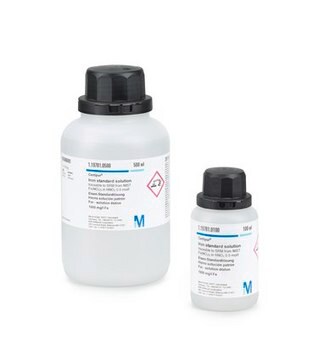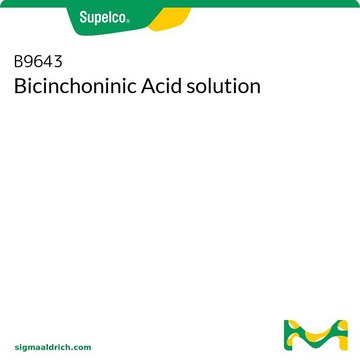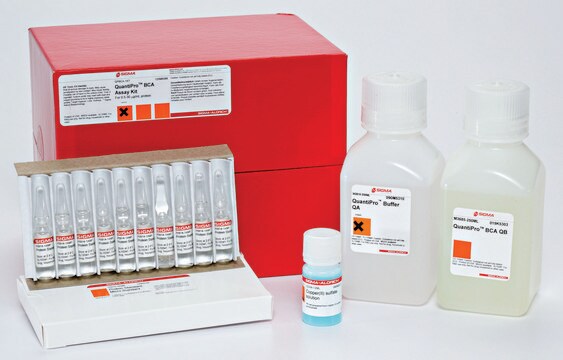1.02784
Copper sulfate solution
c(CuSO₄)=0.1 mol/l, ready-to-use volumetric solution for titration, Titriplex®
Synonym(s):
Copper(II) Sulfate Aqueous Solution
About This Item
Recommended Products
product name
Copper sulfate solution, c(CuSO4)=0.1 mol/l, Titripur®
Quality Level
product line
Titripur®
form
liquid
quality
Analyzed in our ISO 17025 accredited QC lab
reaction suitability
reaction type: Redox Reactions
concentration
0.1 M
technique(s)
titration: suitable
pH
4.2 (20 °C in H2O)
density
1.02 g/m3 at 20 °C
storage temp.
15-25°C
Application
- Self-organized tubular structures as platforms for quantum dots.: This study explores the formation of self-organized tubular structures that can potentially serve as platforms for quantum dots. These structures are formed using copper sulfate solutions in an electrochemical setting, highlighting the versatility and utility of copper sulfate in analytical chemistry applications such as quantum dot technology (Makki R et al., 2014).
- Extended space charge in concentration polarization.: The research discusses the phenomenon of extended space charge within the context of concentration polarization, a critical aspect in electrochemistry and colloid science. Copper sulfate solutions are utilized to study the electrochemical properties and dynamics under various conditions, providing insights into material behavior at the microscale (Rubinstein I et al., 2010).
Features and Benefits
This volumetric solution is analyzed by our calibration laboratory D-K-15185-01-00 which is accredited according to DIN EN ISO/IEC 17025 for analysis of amount-of-substance concentrations in volumetric solutions by DAkkS (Deutsche Akkreditierungsstelle - German National Accreditation Body). The accreditation certificate can be found at www.sigmaaldrich.com/ISO17025.
Packaging
Analysis Note
Amount-of-substance concentration 0.0995 - 0.1005 mol/L
Measurement uncertainty ± 0.0003 mol/L
Traceability NIST SRM
The concentration is determined by volumetric titration and refers to 20°C.
The amount-of-substance concentration of this volumetric solution is determined with standardized titriplex-III solution (article number 1.08431). The titriplex-III solution is standardized and traceable to a primary standard reference material (SRM) from the National Institute of Standards and Technology, Gaithersburg, USA (NIST SRM 682 Zinc) by means of volumetric standard Zinc (article number 1.02409), certified reference material according to ISO 17034, analyzed by our accredited calibration laboratory of Merck KGaA, Darmstadt, Germany according to DIN EN ISO/IEC 17025. The uncertainty is expressed as expanded measurement uncertainty with a coverage factor k=2 covering a confidence level of 95%.
Note: The titer is a correction factor to correct for variations of the volumetric solution, the titration equipment, the temperature and other laboratory conditions. For correct titration results it is recommended to determine a titer with the laboratory specific equipment and under laboratory specific conditions directly after opening a new bottle and at regular time intervals.
Legal Information
related product
Hazard Statements
Precautionary Statements
Hazard Classifications
Aquatic Chronic 3
Storage Class Code
12 - Non Combustible Liquids
WGK
WGK 3
Flash Point(F)
Not applicable
Flash Point(C)
Not applicable
Certificates of Analysis (COA)
Search for Certificates of Analysis (COA) by entering the products Lot/Batch Number. Lot and Batch Numbers can be found on a product’s label following the words ‘Lot’ or ‘Batch’.
Already Own This Product?
Find documentation for the products that you have recently purchased in the Document Library.
Customers Also Viewed
Articles
SmartChemicals enable wireless transfer of CoA data stored on an RFID tag on the consumable bottle to the titrator, reducing effort and chance for human error. Crucial data required for the application is transmitted safely, reliably and intelligently to the instrument.
Our team of scientists has experience in all areas of research including Life Science, Material Science, Chemical Synthesis, Chromatography, Analytical and many others.
Contact Technical Service








